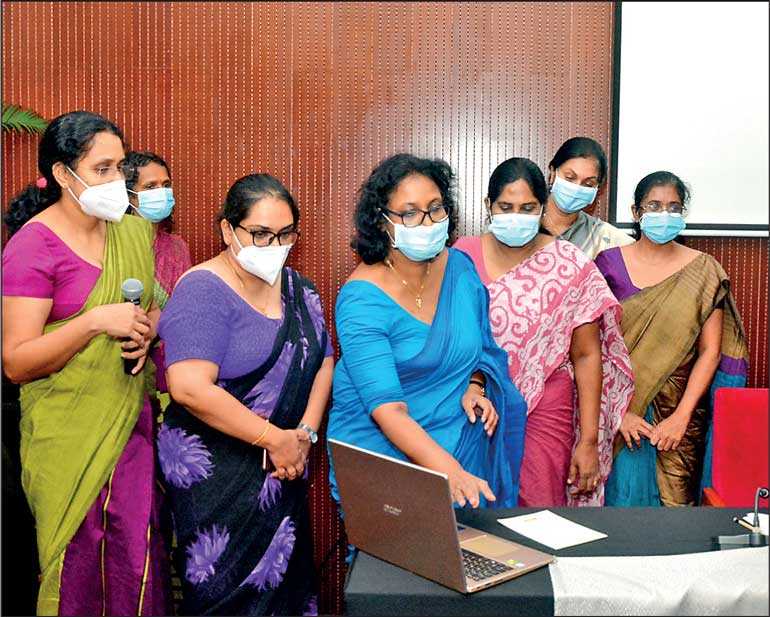Friday Feb 27, 2026
Friday Feb 27, 2026
Friday, 11 December 2020 00:00 - - {{hitsCtrl.values.hits}}

Ministry of Health Additional Secretary (Public Health Services) Dr. Lakshmi Somatunga launching a website. Deputy Director General (Public Health Services) Dr. H. S. R. Perera, Nutrition Division Actg.
Director Dr. Lakmini Magodaratne, Dr. Yasoma Weerasekere, and Dr. Anoma Basnayake looks on - Pic by Upul Abayasekara
The Ministry of Health, Nutrition and Indigenous Medicine with support from the Food and Agriculture
Organization of the United Nations (FAO) launched the Sri Lanka Food-Based Dietary Guidelines (FBDGs) yesterday in Colombo. Country specific FBDGs are one of the FAO/WHO recommended tools to improve healthy eating habits and lifestyles of individuals and populations. Sri Lanka was one of the countries to endorse the FBDGs in the Framework for Action agreed at the Second International
Conference on Nutrition. The Food-Based Dietary Guidelines (also known as dietary guidelines) are
intended to establish a basis for public food and nutrition, health and agricultural policies and nutrition education programs to foster healthy eating habits and lifestyles.The guidelines provide advice on foods, food groups and dietary patterns to provide the required nutrients to the general public to promote overall health and prevent chronic diseases. Sri Lanka first published food-based dietary guidelines in 2002. A revised version was launched in 2011.
“A quick reference guide with the most relevant facts for better nutrition is a public need,” said Ministry of Health Deputy Director General Public Health Services Dr. Susie Perera. “A lot of hard work in the form of extensive research and stakeholder consultations went into the development of this guideline. A wide circulation to empower people with these facts are needed. Therefore, the next steps of implementation and dissemination of the dietary guidelines are equally important.” The guidelines were developed by the Nutrition Division of the Ministry of Health, in consultation with various government
ministries, universities, nutrition associations and institutes, consumer and non-governmental organisa
with these facts are needed. Therefore, the next steps of implementation and dissemination of the dietary guidelines are equally important.” The guidelines were developed by the Nutrition Division of the Ministry of Health, in consultation with various government ministries, universities, nutrition associations and institutes, consumer and non-governmental organisations. Technical and financial support was extended by FAO. The guidelines are adapted to the country’s nutrition situation, food availability, culinary cultures and eating habits. “FAO assists member countries to develop, revise and implement food-based dietary guidelines and food guides in line with current scientific evidence,” said FAO
Representative for Sri Lanka and the Maldives Dr. Xuebing Sun. “Sri Lanka is a country that is facing a triple-burden of malnutrition from staggering rates of stunting and wasting among children, micronutrient
deficiencies, and overweight and obesity especially among women of reproductive age. The causes of malnutrition are complex and multilayered, yet diet is one of the single most important contributors
to malnutrition. These food-based dietary guidelines can favourably impact diets and the food systems in Sri Lanka, from production to consumption,” Dr. Sun noted. The revised Sri Lanka
Food - BasedDietary Guidelines will be published and made available to the public on the website of the
Nutrition Division of the Ministry of Health.